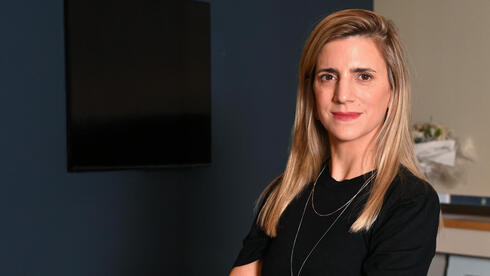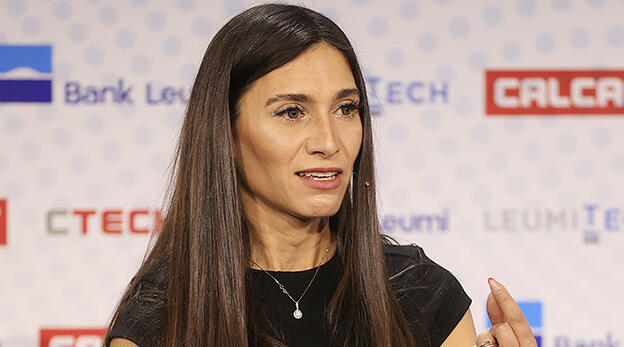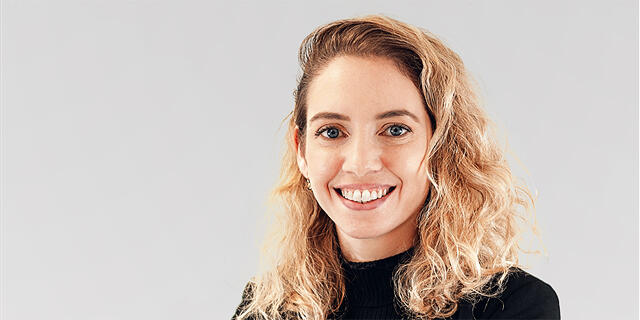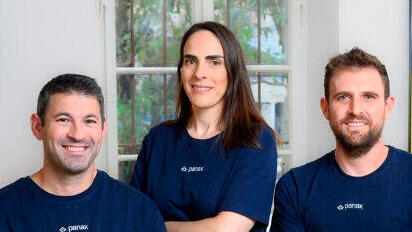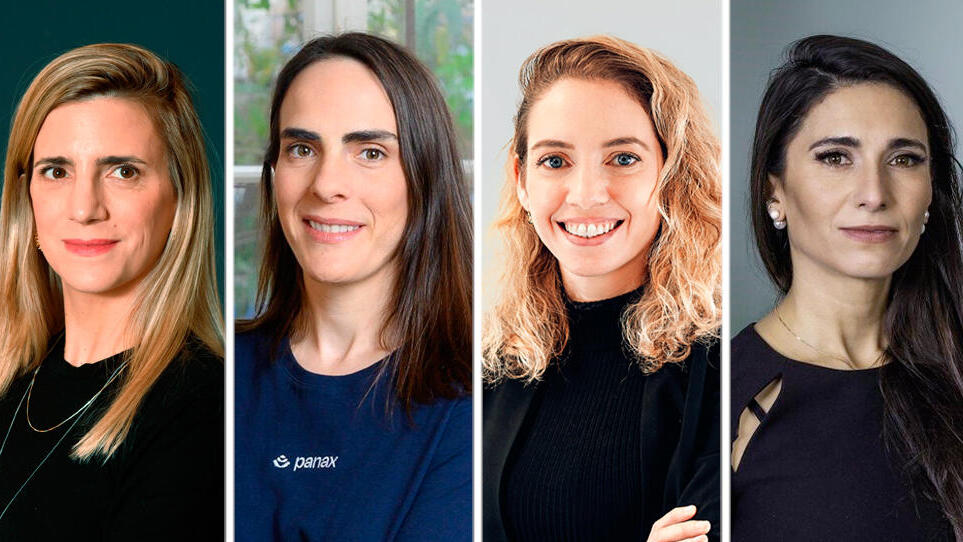
Most Promising Startups - 2025
The female founders shaping Israel’s startup scene in 2025
From Calcalist’s Top 50 list of the most promising private tech companies, these standout innovators are redefining the future of the Startup Nation.
The 16th edition of Calcalist’s Top 50 Most Promising Israeli Startups captures a collective of ambitious and visionary founders who have made an extraordinary mark on the Startup Nation, building some of Israel’s most impactful private tech companies in recent years.
These are individuals applying their ingenuity, resourcefulness and resilience to what is arguably one of Israel’s greatest exports: innovation.
Among them are exceptional female founding entrepreneurs whose contributions to high-tech’s ever-evolving sectors, from DefenseTech to HealthTech, are not only helping to define the startup landscape, but shaping the future of Israel.
Hamutal Meridor (Kela
)
Sector: Defense Tech | Established: 2024 | Founders: Hamutal Meridor, Alon Dror, Jason Manne, Omer Bar-Ilan | Employees: 25 | Funding: $39 million from Sequoia, LUX
Hamutal Meridor began her career at startup YaData, where she stood out as the only woman among 15 men.
“I remember the CEO asking me if it was weird and I didn't understand what he wanted, my mom raised me not to notice,” she previously told CTech.
Meridor was the first to exit after YaData was acquired by Microsoft. “The job was too easy and I didn't like being a small cog in a big machine, it wasn't for me," she said.
Today, Meridor is one of four co-founders of Kela, a startup established in 2024 that is steadily emerging as a major player in the global Defense Tech sector. With a team of 25, the company has raised $39 million from top-tier investors including Sequoia and LUX Capital, and ranks sixth on Calcalist’s 2025 list of the 50 Most Promising Israeli Startups.
Like many on the list, Meridor was in the elite IDF Intelligence Corps Unit 8200, where she served as an Intelligence Analyst. She later earned a BSc in Computer Science and Cognitive Science from the Hebrew University of Jerusalem and an MSc in Natural Language Processing from the University of Edinburgh.
Before launching Kela, she co-founded the online reputation platform Daps’em, was the Senior Director of Open Source Web Intelligence at Verint, the GM of Israel for Palantir Technologies, and Partner at global VC firm Vintage Investment Partners.
Sanaz Yashar (Zafran )
Sector: Cyber | Established: 2022 | Founders: Sanaz Yashar, Ben Seri, Snir Havdala | Employees: 100, half in Israel and the US | Funding: $70 million from Sequoia, CERCA, CyberStarts, the David Fisher Foundation, Penny Jar
Born in Tehran, Sanaz Yashar was considered a young prodigy when she represented Iran in the Chemistry Olympiad. Then, at age 16, she published an article criticising the Iranian Revolution in her school newspaper. The move led to threats against her family, ultimately forcing them to flee the country.
After immigrating to Israel, Yashar went on to serve nearly 15 years in Unit 8200, rising to the rank of Major. She later earned a BSc in Biochemistry and Molecular Biology from Tel Aviv University and an MNA from Ben-Gurion University of the Negev.
Professionally, Yashar led cyber threat research and analysis teams at FireEye – Mandiant (acquired by Google), contributing to major geopolitical investigations. Among them was a cyberattack on an Israeli hospital, in which she collaborated with her future co-founders, Snir Havdala and Ben Seri.
"I grew up in Tehran and spent my early years evading the Iranian police before immigrating to Israel. Later, I served for a long time in intelligence,” Yashar said earlier this year, speaking on a panel at Calcalist and Bank Leumi’s Mind the Tech conference in New York.
“At 15, a shift begins for girls—the realization that they can be whatever they want. Fortunately, I met the right people at the right time, which allowed me to survive and become the woman I am today.”
In 2022, Yashar co-founded Zafran alongside Snir and Ben. Despite entering a saturated sector, the cybersecurity startup (which focuses on identifying vulnerabilities in corporate systems) has raised $70 million from Sequoia, CERCA, CyberStarts, the David Fisher Foundation, and Penny Jar. The company now employs 100 people across Israel and the US, and ranks 12th in Calcalist's 2025 list of the 50 Most Promising Israeli Startups.
Outside of Zafran, Yashar continues to support young professional women in Israel as a mentor with the Woman2Woman - 8200 Alumni Association program.
Related articles:
- Grain secures $33 million Series A to help businesses hedge currency risks in real time
- “My co-founder discovered abuse at her daycare and we thought how can technology help solve these issues”
- Yulia Bassan: "Women are being taught that they need to be more humble... But then when you do that, no one sees you."
Michal Beinisch (Grain )
Sector: Fintech | Established: 2022 | Founders: Dor Golan, Aharon Navon, Michal Beinisch, Nir Galon | Employees: 30 | Funding: $51 million from Bain Capital Ventures, Vesey Ventures, Aleph, Hanaco Ventures
Michal Beinisch is currently the COO and Co-Founder of Israeli fintech startup Grain, which specializes in foreign exchange (FX) optimization. Founded in 2022, Grain has raised $51 million to date from Bain Capital Ventures, Vesey Ventures, Aleph, and Hanaco Ventures.
The company currently employs 25 people, with plans to double its workforce by the end of the year.
Before launching Grain with her three male co-founders, Beinisch served as COO of Barclays Israel and as Global Head of Rise, Barclays’ fintech innovation platform. Prior to that, she obtained a Bachelor of Arts in Hebrew Literature and Comparative Literature from Tel Aviv University.
Following the events of October 7th, Beinisch co-founded The Civilian Emergency HQ (also known as Brothers and Sisters for Israel) alongside fellow industry leaders including prominent venture capitalist, Gigi Levy-Weiss,CEO of Papaya Global, Eynat Guez, and members of the Brothers in Arms protest movement.
Founded amid Israel’s 2023 high-tech protest against the government’s judicial overhaul, it is now the largest civilian aid group of its kind in Israel. It operates in full coordination with the Israeli military and is run entirely by over 15,000 volunteers, including former military personnel, high-tech professionals, and students.
The organization’s efforts have included supporting evacuated families, assisting the needs of IDF soldiers, and, during the first two weeks of the war, the country’s main missing persons hotline operated out of the HQ.
Romi Gubes (Sensi.ai )
Sector: Healthtech | Established: 2020 | Founders: Romi Gubes, Nevo Elmalem, Alon Brener | Employees: 90 | Funding: $53 million from Zeev Ventures, Insight Partners, Entrée Capital, Flint Capital, Jibe Ventures, Secret Chord Ventures
Twelve years ago, a traumatic incident involving her kindergarten-aged daughter inspired Romi Gubes to channel her technical expertise to help protect vulnerable populations. The experience eventually led her to co-found Sensi.ai, where she now serves as CEO.
Founded in 2020 alongside Nevo Elmalem and Alon Brener, Sensi.ai is building the world’s first virtual home care platform powered by AI. The company has raised $53 million from Zeev Ventures, Insight Partners, Entrée Capital, Flint Capital, Jibe Ventures, and Secret Chord Ventures. It currently employs 90 people across offices in Tel Aviv, Austin, Texas, and Palo Alto, California.
"We enable people to age at home as much as possible, monitoring home environments and detecting changing needs through audio-based software and hardware,” Gubes previously explained in an interview with Calcalist.
“We provide systems to businesses selling home care solutions, making a global impact with technology that has saved countless lives. Currently, we serve thousands of patients in the United States, primarily through small and medium-sized providers and individual customers."
Before launching Sensi.ai, Gubes worked as a software engineer for leading tech companies across Israel including Cisco, EMC, and Vonage, where she played a key role in developing its mobile app. Before entering the corporate workforce, she served as an Education Officer in the Israeli Air Force and later earned a BSc in Computer Software Engineering from Ben-Gurion University of the Negev.
Related articles:
- Grain secures $33 million Series A to help businesses hedge currency risks in real time
- “My co-founder discovered abuse at her daycare and we thought how can technology help solve these issues”
- Yulia Bassan: "Women are being taught that they need to be more humble... But then when you do that, no one sees you."
Noam Mills (Panax )
Sector: AI-driven cash management | Established: 2022 | Founders: Noam Mills, Sefi Itzkovich, Niv Yaar | Employees: 32 employees, the majority in Israel, opened in New York last year | Funding: $15 million from TLV Partners, Team8
Noam Mills is a familiar name both within and beyond the high-tech world. Now the co-founder of Panax, an AI-powered cash management platform, she is also a former Olympic fencer who represented Israel at the 2008 Beijing Olympics.
Mills holds two degrees from Harvard University: a BA in Economics with a minor in Neurobiology, and an MBA from Harvard Business School.
Before founding Panax, she worked as a Senior Associate at Boston Consulting Group, served as Vice President at Ishay Davidi’s FIMI investment fund, and was VP of Finance at Israeli startup Mixtiles.
Panax was founded in 2022 by Mills, alongside Niv Yaar (whom she met during her time at FIMI) and Sefi Itzkovich, the former CFO of Otonomo. The idea came from Mills’ observation that smaller, complex companies lacked adequate control over their cash flow.
“In our previous roles, we couldn’t ignore the struggle of finance teams in companies with complex treasury operations,” Mills previously stated.
“The more a company grows, the more complex it gets, working across many entities and regions and juggling many bank accounts and currencies. That always results in poor cash flow visibility, outdated or faulty data and a general lack of control. You are constantly bouncing between cash flow issues and suboptimal liquidity allocation. That’s why we created Panax.”
The company has raised $15 million in funding from TLV Partners and Team8, and boasts a client roster that includes Artlist, Elementor, Oddity, and Lightricks. It currently employs 32 people and recently opened an office in New York.

